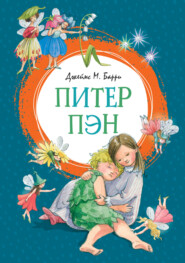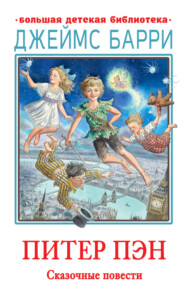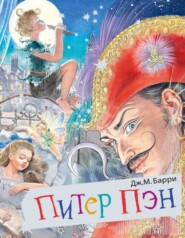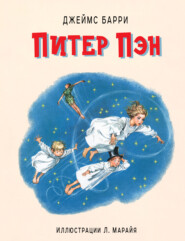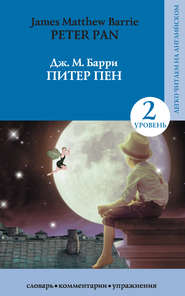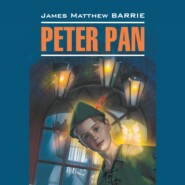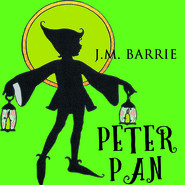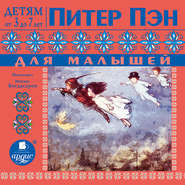По всем вопросам обращайтесь на: info@litportal.ru
(©) 2003-2024.
✖
The Little Minister
Настройки чтения
Размер шрифта
Высота строк
Поля
They had not advanced many yards when Spens jumped to the side, crying, “Be wary, that’s no the wind; it’s a machine!”
Immediately the doctor’s dogcart was close to them, with Rob Dow for its only occupant. He was driving slowly, or Whamond could not have escaped the horse’s hoofs.
“Is that you, Rob Dow?” said the precentor sourly. “I tell you, you’ll be gaoled for stealing the doctor’s machine.”
“The Hielandman wasna muckle hurt, Rob,” Hendry said, more good-naturedly.
“I ken that,” replied Rob, scowling at the four of them. “What are you doing here on sic a nicht?”
“Do you see anything strange in the nicht, Rob?” Tosh asked apprehensively.
“It’s setting to rain,” Dow replied. “I dinna see it, but I feel it.”
“Ay,” said Tosh, eagerly, “but will it be a saft, cowdie sweet ding-on?”
“Let the heavens open if they will,” interposed Spens recklessly. “I would swap the drought for rain, though it comes down in a sheet as in the year twelve.”
“And like a sheet it’ll come,” replied Dow, “and the deil’ll blaw it about wi’ his biggest bellowses.”
Tosh shivered, but Whamond shook him roughly, saying —
“Keep your oaths to yoursel’, Rob Dow, and tell me, hae you seen Mr. Dishart?”
“I hinna,” Rob answered curtly, preparing to drive on.
“Nor the lassie they call the Egyptian?”
Rob leaped from the dogcart, crying, “What does that mean?”
“Hands off,” said the precentor, retreating from him. “It means that Mr. Dishart neglected the prayer-meeting this nicht to philander after that heathen woman.”
“We’re no sure o’t, Tammas,” remonstrated the kirk officer. Dow stood quite still. “I believe Rob kens it’s true,” Hendry added sadly, “or he would hae flown at your throat, Tammas Whamond, for saying these words.”
Even this did not rouse Dow.
“Rob doesna worship the minister as he used to do,” said Spens.
“And what for no?” cried the precentor. “Rob Dow, is it because you’ve found out about this woman?”
“You’re a pack o’ liars,” roared Rob, desperately, “and if you say again that ony wandering hussy has haud o’ the minister, I’ll let you see whether I can loup at throats.”
“You’ll swear by the Book,” asked Whamond, relentlessly, “that you’ve seen neither o’ them this nicht, nor them thegither at any time?”
“I so swear by the Book,” answered poor loyal Rob. “But what makes you look for Mr. Dishart here?” he demanded, with an uneasy look at the light in the mudhouse.
“Go hame,” replied the precentor, “and deliver up the machine you stole, and leave this Session to do its duty. John, we maun fathom the meaning o’ that licht.”
Dow started, and was probably at that moment within an ace of felling Whamond.
“I’ll come wi’ you,” he said, hunting in his mind for a better way of helping Gavin.
They were at Nanny’s garden, but in the darkness Whamond could not find the gate. Rob climbed the paling, and was at once lost sight of. Then they saw his head obscure the window. They did not, however, hear the groan that startled Babbie.
“There’s nobody there,” he said, coming back, “but Nanny and Sanders. You’ll mind Sanders was to be freed the day.”
“I’ll go in and see Sanders,” said Hendry, but the precentor pulled him back, saying, “You’ll do nothing o’ the kind, Hendry Munn; you’ll come awa wi’ me now to the manse.”
“It’s mair than me and Peter’ll do, then,” said Spens, who had been consulting with the other farmer. “We’re gaun as straucht hame as the darkness’ll let us.”
With few more words the Session parted, Spens and Tosh setting off for their farms, and Hendry accompanying the precentor. No one will ever know where Dow went. I can fancy him, however, returning to the wood, and there drawing rein. I can fancy his mind made up to watch the mudhouse until Gavin and the gypsy separated, and then pounce upon her. I daresay his whole plot could be condensed into a sentence, “If she’s got rid o’ this nicht, we may cheat the Session yet.” But this is mere surmise. All I know is that he waited near Nanny’s house, and by and by heard another trap coming up Windyghoul. That was just before the ten o’clock bell began to ring.
Chapter Thirty-Two.
LEADING SWIFTLY TO THE APPALLING MARRIAGE
The little minister bowed his head in assent when Babbie’s cry, “Oh, Gavin, do you?” leapt in front of her unselfish wish that he should care for her no more.
“But that matters very little now,” he said.
She was his to do with as he willed; and, perhaps, the joy of knowing herself loved still, begot a wild hope that he would refuse to give her up. If so, these words laid it low, but even the sentence they passed upon her could not kill the self-respect that would be hers henceforth. “That matters very little now,” the man said, but to the woman it seemed to matter more than anything else in the world.
Throughout the remainder of this interview until the end came, Gavin never faltered. His duty and hers lay so plainly before him that there could be no straying from it. Did Babbie think him strangely calm? At the Glen Quharity gathering I once saw Rob Angus lift a boulder with such apparent ease that its weight was discredited, until the cry arose that the effort had dislocated his arm. Perhaps Gavin’s quietness deceived the Egyptian similarly. Had he stamped, she might have understood better what he suffered, standing there on the hot embers of his passion.
“We must try to make amends now,” he said gravely, “for the wrong we have done.”
“The wrong I have done,” she said, correcting him. “You will make it harder for me if you blame yourself. How vile I was in those days!”
“Those days,” she called them, they seemed so far away.
“Do not cry, Babbie,” Gavin replied, gently. “He knew what you were, and why, and He pities you. ‘For His anger endureth but a moment: in His favor is life: weeping may endure for a night, but joy cometh in the morning.’”
“Not to me.”
“Yes, to you,” he answered. “Babbie, you will return to the Spittal now, and tell Lord Rintoul everything.”
“If you wish it.”
“Not because I wish it, but because it is right. He must be told that you do not love him.”
“I never pretended to him that I did,” Babbie said, looking up. “Oh,” she added, with emphasis, “he knows that. He thinks me incapable of caring for any one.”
“And that is why he must be told of me,” Gavin replied. “You are no longer the woman you were, Babbie, and you know it, and I know it, but he does not know it. He shall know it before he decides whether he is to marry you.”
Babbie looked at Gavin, and wondered he did not see that this decision lay with him.
“Nevertheless,” she said, “the wedding will take place to-morrow; if it did not, Lord Rintoul would be the scorn of his friends.”
“If it does,” the minister answered, “he will be the scorn of himself. Babbie, there is a chance.”
Immediately the doctor’s dogcart was close to them, with Rob Dow for its only occupant. He was driving slowly, or Whamond could not have escaped the horse’s hoofs.
“Is that you, Rob Dow?” said the precentor sourly. “I tell you, you’ll be gaoled for stealing the doctor’s machine.”
“The Hielandman wasna muckle hurt, Rob,” Hendry said, more good-naturedly.
“I ken that,” replied Rob, scowling at the four of them. “What are you doing here on sic a nicht?”
“Do you see anything strange in the nicht, Rob?” Tosh asked apprehensively.
“It’s setting to rain,” Dow replied. “I dinna see it, but I feel it.”
“Ay,” said Tosh, eagerly, “but will it be a saft, cowdie sweet ding-on?”
“Let the heavens open if they will,” interposed Spens recklessly. “I would swap the drought for rain, though it comes down in a sheet as in the year twelve.”
“And like a sheet it’ll come,” replied Dow, “and the deil’ll blaw it about wi’ his biggest bellowses.”
Tosh shivered, but Whamond shook him roughly, saying —
“Keep your oaths to yoursel’, Rob Dow, and tell me, hae you seen Mr. Dishart?”
“I hinna,” Rob answered curtly, preparing to drive on.
“Nor the lassie they call the Egyptian?”
Rob leaped from the dogcart, crying, “What does that mean?”
“Hands off,” said the precentor, retreating from him. “It means that Mr. Dishart neglected the prayer-meeting this nicht to philander after that heathen woman.”
“We’re no sure o’t, Tammas,” remonstrated the kirk officer. Dow stood quite still. “I believe Rob kens it’s true,” Hendry added sadly, “or he would hae flown at your throat, Tammas Whamond, for saying these words.”
Even this did not rouse Dow.
“Rob doesna worship the minister as he used to do,” said Spens.
“And what for no?” cried the precentor. “Rob Dow, is it because you’ve found out about this woman?”
“You’re a pack o’ liars,” roared Rob, desperately, “and if you say again that ony wandering hussy has haud o’ the minister, I’ll let you see whether I can loup at throats.”
“You’ll swear by the Book,” asked Whamond, relentlessly, “that you’ve seen neither o’ them this nicht, nor them thegither at any time?”
“I so swear by the Book,” answered poor loyal Rob. “But what makes you look for Mr. Dishart here?” he demanded, with an uneasy look at the light in the mudhouse.
“Go hame,” replied the precentor, “and deliver up the machine you stole, and leave this Session to do its duty. John, we maun fathom the meaning o’ that licht.”
Dow started, and was probably at that moment within an ace of felling Whamond.
“I’ll come wi’ you,” he said, hunting in his mind for a better way of helping Gavin.
They were at Nanny’s garden, but in the darkness Whamond could not find the gate. Rob climbed the paling, and was at once lost sight of. Then they saw his head obscure the window. They did not, however, hear the groan that startled Babbie.
“There’s nobody there,” he said, coming back, “but Nanny and Sanders. You’ll mind Sanders was to be freed the day.”
“I’ll go in and see Sanders,” said Hendry, but the precentor pulled him back, saying, “You’ll do nothing o’ the kind, Hendry Munn; you’ll come awa wi’ me now to the manse.”
“It’s mair than me and Peter’ll do, then,” said Spens, who had been consulting with the other farmer. “We’re gaun as straucht hame as the darkness’ll let us.”
With few more words the Session parted, Spens and Tosh setting off for their farms, and Hendry accompanying the precentor. No one will ever know where Dow went. I can fancy him, however, returning to the wood, and there drawing rein. I can fancy his mind made up to watch the mudhouse until Gavin and the gypsy separated, and then pounce upon her. I daresay his whole plot could be condensed into a sentence, “If she’s got rid o’ this nicht, we may cheat the Session yet.” But this is mere surmise. All I know is that he waited near Nanny’s house, and by and by heard another trap coming up Windyghoul. That was just before the ten o’clock bell began to ring.
Chapter Thirty-Two.
LEADING SWIFTLY TO THE APPALLING MARRIAGE
The little minister bowed his head in assent when Babbie’s cry, “Oh, Gavin, do you?” leapt in front of her unselfish wish that he should care for her no more.
“But that matters very little now,” he said.
She was his to do with as he willed; and, perhaps, the joy of knowing herself loved still, begot a wild hope that he would refuse to give her up. If so, these words laid it low, but even the sentence they passed upon her could not kill the self-respect that would be hers henceforth. “That matters very little now,” the man said, but to the woman it seemed to matter more than anything else in the world.
Throughout the remainder of this interview until the end came, Gavin never faltered. His duty and hers lay so plainly before him that there could be no straying from it. Did Babbie think him strangely calm? At the Glen Quharity gathering I once saw Rob Angus lift a boulder with such apparent ease that its weight was discredited, until the cry arose that the effort had dislocated his arm. Perhaps Gavin’s quietness deceived the Egyptian similarly. Had he stamped, she might have understood better what he suffered, standing there on the hot embers of his passion.
“We must try to make amends now,” he said gravely, “for the wrong we have done.”
“The wrong I have done,” she said, correcting him. “You will make it harder for me if you blame yourself. How vile I was in those days!”
“Those days,” she called them, they seemed so far away.
“Do not cry, Babbie,” Gavin replied, gently. “He knew what you were, and why, and He pities you. ‘For His anger endureth but a moment: in His favor is life: weeping may endure for a night, but joy cometh in the morning.’”
“Not to me.”
“Yes, to you,” he answered. “Babbie, you will return to the Spittal now, and tell Lord Rintoul everything.”
“If you wish it.”
“Not because I wish it, but because it is right. He must be told that you do not love him.”
“I never pretended to him that I did,” Babbie said, looking up. “Oh,” she added, with emphasis, “he knows that. He thinks me incapable of caring for any one.”
“And that is why he must be told of me,” Gavin replied. “You are no longer the woman you were, Babbie, and you know it, and I know it, but he does not know it. He shall know it before he decides whether he is to marry you.”
Babbie looked at Gavin, and wondered he did not see that this decision lay with him.
“Nevertheless,” she said, “the wedding will take place to-morrow; if it did not, Lord Rintoul would be the scorn of his friends.”
“If it does,” the minister answered, “he will be the scorn of himself. Babbie, there is a chance.”






